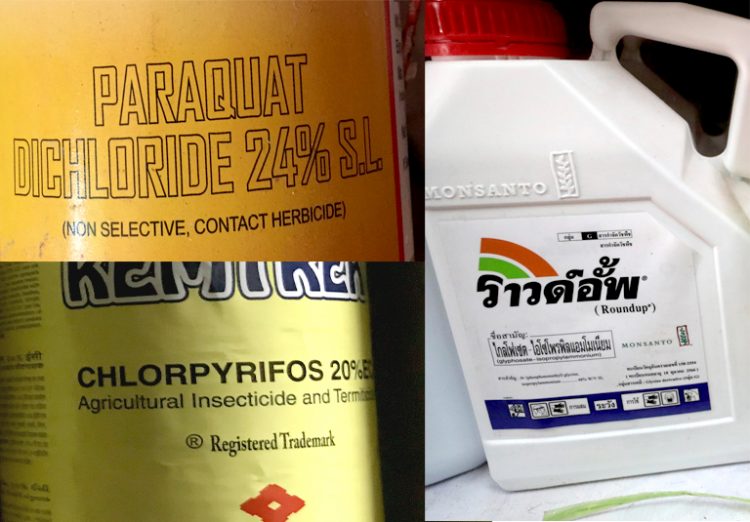US ‘Meddling’ A Cause For Concern
Pesticide Action Network Asia and the Pacific (PANAP) hails the decision of Thailand’s National Hazardous Substances Committee to ban glyphosate, chlorpyrifos and paraquat. Last October 22, the committee voted in favour of banning these three agrochemicals, considered by PANAP as Highly Hazardous Pesticides (HHPs) and part of the Terrible Twenty pesticides that are especially toxic to children.
“We have long fought for the ban of these HHPs, which have also been banned in several other countries because of their proven toxicity. We laud Thai public officials for taking a decisive step to safeguard the health of its people. This is a victory for farmers, as well as their children, who can now be spared from further poisoning,” said Sarojeni Rengam, PANAP executive director.
Thailand is the second country in Southeast Asia to ban all three chemicals; with Vietnam earlier banning glyphosate, chlorpyrifos and paraquat.
Rengam, however, expressed concern over the US Department of Agriculture’s letter urging the Thai government to delay the ban on the chemicals, particularly glyphosate. “The US should stop meddling into policies that aim to protect the health and welfare of sovereign nations such as Thailand. It should also stop peddling lies on glyphosate’s safety, when these have been exposed in US courts to have been based on studies manufactured by Monsanto,” Rengam added.
Instead, Rengam said that the bans on the three chemicals is a positive step in ending double standards in pesticides trade, or the practice of exporting hazardous chemicals already banned in their countries of origin. “The bans underscore the need for an international mechanism to eliminate Highly Hazardous Pesticides. Thousands of lives—not just in Thailand, but in other countries in the region—could be saved each year if such a mechanism were in place,” Rengam said.
According to PANAP, it’s important for the Thai government to support farmers in transitioning to agroecological practices. “The Thai government must assuage the fear of farmers who are now looking for alternatives. The alternative isn’t so-called less toxic chemicals, but agroecology—an economically viable and socially just approach to sustainable agriculture and food systems. The Thai government has a golden opportunity to show the world that farming can not only be safer, but can become even more successful without the use of glyphosate, chlorpyrifos and paraquat,” Rengam said.
According to a 2015 study by researchers from the Ministry of Public Health and Chulalongkorn University entitled Pesticides Use in Thailand and Toxic Effects to Human Health, there were about 49,000 to 61,000 reported cases of pesticide intoxication in Thailand each year, with a morbidity rate between 76.4 and 96.6 per 100,000 populations.
Glyphosate and paraquat were the most intensively used herbicides with 27 and 13 million kilograms used in 2013, respectively. Glyphosate, classified as a probable carcinogen by the International Agency for Research on Cancer, is the subject of thousands of lawsuits in the US due to its link to non-Hodgkin’s lymphoma and other illnesses. Several countries, among the latest of which is Germany, have announced plans to phaseout glyphosate. Paraquat, meanwhile, is banned in 46* countries, with thousands of farmers and agricultural workers having suffered severe acute and chronic effects from occupational use.
Chlorpyrifos was the primary insecticide imported to Thailand, with more than a million kgs. per year. It has been linked to severe and permanent brain damage in young children, including ADHD, IQ loss and autism. It was also among the toxic pesticides whose residues were found by the Thai-Pesticide Alert Network in 41% of fruits sold in local markets.
PANAP, together with its partners across the globe, is launching an international campaign to push for a legally-binding mechanism to ban pesticides and replace it with agroecology, in time for the Fifth Meeting of the International Conference on Chemicals Management in October 2020.
Reference: Deeppa Ravindran, Protect Our Children From Toxic Pesticides Campaign Coordinator, deeppa.ravindran@panap.net.
*According to the latest PAN International Consolidated List of Banned Pesticides
PAN Asia Pacific (PANAP) is one of five regional centres of Pesticide Action Network, a global network dedicated to the elimination of harm upon humans and the environment by pesticide use. It is based in Penang, Malaysia.








Discussion about this post